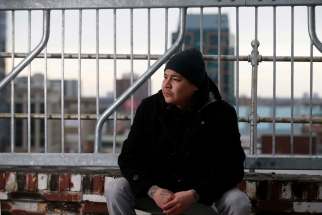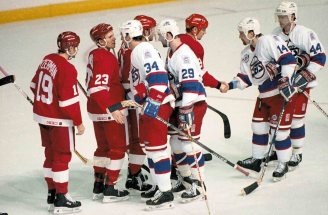The last flight Former Jets, Red Wings remember the emotionally draining final (everyone thought) NHL game in Winnipeg 25 years ago
Read this article for free:
or
Already have an account? Log in here »
To continue reading, please subscribe:
Monthly Digital Subscription
$0 for the first 4 weeks*
- Enjoy unlimited reading on winnipegfreepress.com
- Read the E-Edition, our digital replica newspaper
- Access News Break, our award-winning app
- Play interactive puzzles
*No charge for 4 weeks then price increases to the regular rate of $19.00 plus GST every four weeks. Offer available to new and qualified returning subscribers only. Cancel any time.
Monthly Digital Subscription
$4.75/week*
- Enjoy unlimited reading on winnipegfreepress.com
- Read the E-Edition, our digital replica newspaper
- Access News Break, our award-winning app
- Play interactive puzzles
*Billed as $19 plus GST every four weeks. Cancel any time.
To continue reading, please subscribe:
Add Free Press access to your Brandon Sun subscription for only an additional
$1 for the first 4 weeks*
*Your next subscription payment will increase by $1.00 and you will be charged $16.99 plus GST for four weeks. After four weeks, your payment will increase to $23.99 plus GST every four weeks.
Read unlimited articles for free today:
or
Already have an account? Log in here »
Hey there, time traveller!
This article was published 27/04/2021 (1695 days ago), so information in it may no longer be current.
The familiar refrain, “Wait until next year,” just didn’t apply on a spring Sunday afternoon 25 years ago in Winnipeg.
When the Jets lost 4-1 to the Detroit Red Wings on April 28, 1996, the NHL team, its fans and the city lost all of their next years.
That is, until 2011. But that’s another story, one that seemed unfathomable at the time.
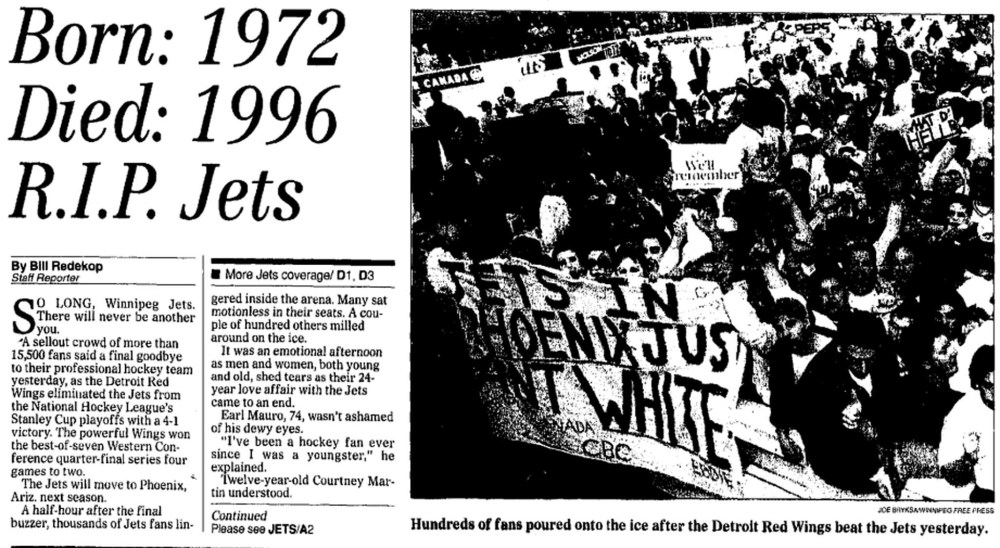
The Jets were headed south to the Arizona desert, never to soar through Manitoba airspace again. And so, for the 15,500 spectators — all donning their finest whites — crammed into Winnipeg Arena for Game 6 of an opening-round playoff series with Detroit, it was, indeed, the final farewell.
With veteran coach Terry Simpson behind the bench and John Paddock occupying the general manager’s chair, the Jets managed to qualify for the playoffs with a home-ice victory over the Los Angeles Kings in the second-last game of the 1995-96 regular season.
The lame-duck season, as it were.
Winnipeg, which had traded adored scoring-sensation Teemu Selanne to the Anaheim Mighty Ducks in February, somehow slipped in with a 36-40-6 record.
The reward? A meeting with the Scotty Bowman-coached Red Wings, which set a record with 62 victories in a season (62-13-7). They captured the President’s Trophy with the league’s best record, finishing 24 points ahead of the next best team, the Philadelphia Flyers.
Detroit’s roster read like an all-star squad, with forwards Steve Yzerman, Sergei Federov, Dino Ciccarelli, Vyacheslav Kozlov, Igor Larionov and Keith Primeau, defencemen Paul Coffey, Nicklas Lidstrom, Slava Fetisov and Vladimir Konstantinov, and goaltenders Mike Vernon and Chris Osgood.
The Jets had 50-goal scorer Keith Tkachuk, Alexei Zhamnov, Igor Korolev, Ed Olczyk, Dallas Drake and teenager Shane Doan up front, with Teppo Numminen, Norm Maciver and Dave Manson on the blue line and Nikolai Khabibulin in net.
This one had mismatch written all over it.
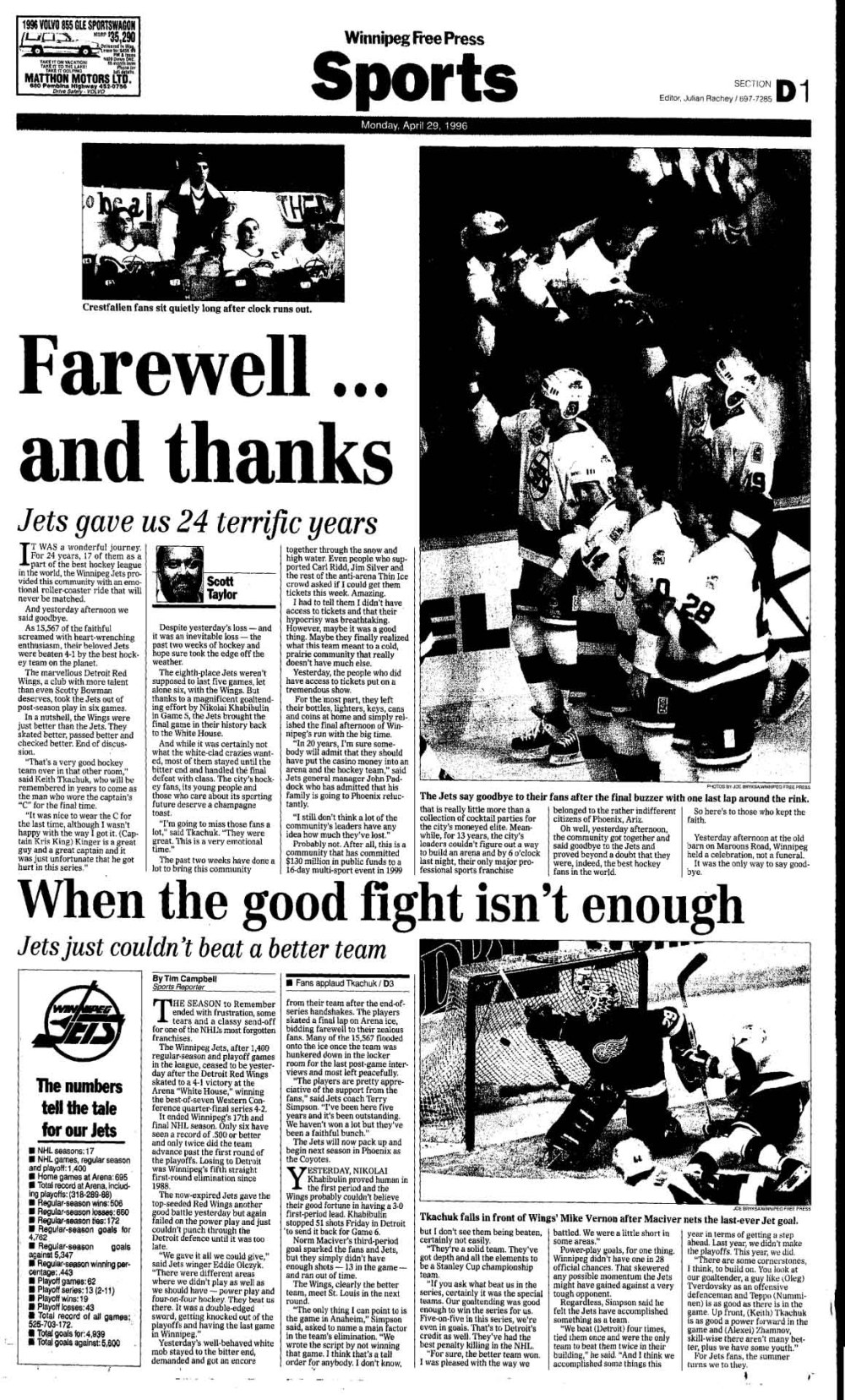
After a pair of games at Joe Louis Arena and two more at the old barn on Maroons Road, the Jets trailed 3-1 in the best-of-seven series but managed to steal a win in Detroit in Game 5, riding a mesmerizing 51-save performance by the “Khublin Wall.”
So, the squads made an improbable trip back to the “White House” for Game 6.
On the 25th anniversary of the last game in Jets 1.0 history, a few participants from that memorable afternoon game at Polo Park shared their memories with the Free Press.
●●●
He was the captain of a sinking ship. And Kris King, playing in his 10th NHL season and fourth in Winnipeg, had never experienced anything quite like this.
One more loss and it wasn’t just farewell to a season, but to an entire city. And the Jets were living on borrowed time against a dynasty-in-the-making.
“We already knew where we were going, we already knew what we were going to be called, and here we were trying to win a playoff series against an unbelievable team. The Russians. Yzerman, Lidstrom, Coffey. They were a powerhouse,” King, 55, recalled in a phone conversation with the Free Press from his office in Toronto, where he now works for the NHL as the senior vice president of hockey operations.
“You could just feel like this was it, even the fans could feel it. It was pretty sombre. You knew that what you had grown to love and were proud of was gone as soon as you lost that last game.”
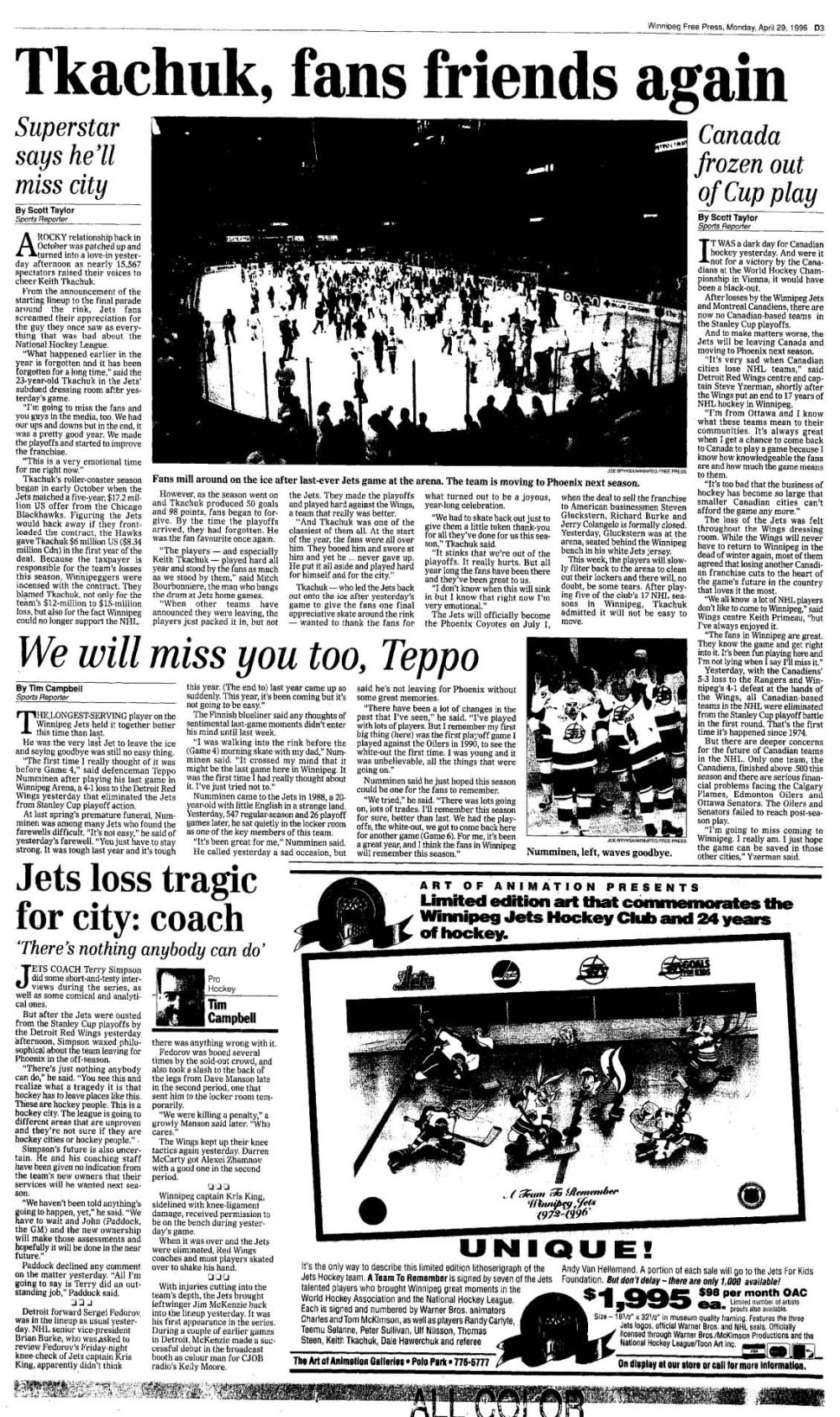
And they did indeed come up short, unable to push the series back to Motown for a winner-take-all deciding tilt, where who knows what might have happened.
“Before (the playoffs) began, I think everyone had us losing four straight. Or maybe even in three, because they were so good,” King said with a chuckle.
“But we gave them everything they could handle. We didn’t go away very easily. At the beginning of the season I said, ‘Guys this is what we’re going to hear all year, but let’s just make it fun for this group, let’s do the best we can for our fans, lets go out with a bang, let’s not whimper out of here. To our credit, we got to the playoffs, I think the way we competed against Detroit, we surprised a lot of people.”
One of King’s biggest regrets is not being able to suit up for that final game, the result of an injury suffered in his squad’s unexpected Game 5 victory that gave his group one final Whiteout.
“We were killing a penalty. I blocked a shot, and the puck went the other way. (Sergei) Federov stuck out his knee and I tore my knee,” said King.
As a result, there was a particularly helpless feeling in watching the bitter end arrive from his perch behind the Jets bench that night, as a makeshift assistant coach.
“It kind of felt like a funeral. I remember being on the bench and hugging Thomas Steen, who was crying. He was very emotional. This was his home, and it was over,” said King.
“I remember sitting in the locker room after the game for a long time. Our families just waited and waited. They knew this was our time together. We were a real close-knit group. We had tried to enjoy what was inevitably a pretty sad season for us, knowing what was next.”

As the captain of the team and someone highly visible in the community, the native of Bracebridge, Ont., saw the passion first-hand, including the Save The Jets campaign, the public rallies and the fundraising efforts. He had arrived in Winnipeg, along with fan favourite Tie Domi, in a December 1992 trade with the New York Rangers that sent Ed Olczyk the other way. And the city quickly began to feel like home.
“There was a real camaraderie with the team and the fans. There was a great history and a real sense of honour for Jets fans. It really was a strange season. You always had conversations with the fans — that’s one thing about Winnipeg — you couldn’t go very far (without someone stopping a Jet to chat). But what were you going to do? What were you going to say? This was the whole group that was being traded,” said King.
“I remember seeing kids coming up with money from their piggy banks. But all that fundraising and all the piggy banks weren’t going to keep us there. I think we dug deep as professionals and tried to do the best we could for the fans and for ourselves.”
King was one of the ones who followed the franchise to the desert, playing the next season in Phoenix before moving on to Toronto for three years, followed by a final stop in Chicago before his retirement. All told, he skated in 849 regular-season games and 67 playoff contests.
“My four years in Winnipeg was probably my fondest memories of playing the game,” said King, who initially felt there was no hope of the NHL ever coming back to the city.
“But then you started to hear about Mark Chipman, and the success of the Moose, and the new arena and what they were doing, and you started thinking ‘You know what? These guys are going to get a team,'” he said.
“And now it’s a great success story. You have to give Mark and his partner’s credit, they did everything they could to get a team back and it’s been very important to Winnipeg.”
●●●

At the time, Norm Maciver thought his third-period goal might ignite a miraculous Jets comeback in Game 6 of their series with the Red Wings.
Only later did he come to realize a shot he ripped from the slot that beat Mike Vernon high to the blocker side at 8:22 of the final frame would live on in the annals of Winnipeg hockey history.
“Once in a while someone will mention it to me. It’s pretty cool,” Maciver said. “I remember a lot of what happened that night. There was so much emotion; a special one, but a sad one, too.”
The Jets had obtained Maciver just three days after Christmas 1995, sending Selkirk product Neil Wilkinson to the Penguins in a swap of veteran defencemen. Maciver, a skilled and mobile blue-liner from Thunder Bay, put up impressive numbers in his short time in Winnipeg, scoring five times and collecting 25 assists in 39 games.
Overall, he played 501 NHL games over parts of a dozen seasons, split between the New York Rangers, Edmonton Oilers, Ottawa Senators, Pittsburgh Penguins, Jets and Coyotes. He registered 55 regular-season goals and three more in the post-season, including the historic marker at Winnipeg Arena.
He vividly remembers the tally that trimmed Detroit’s lead to 3-1.
“The puck was dumped to the right corner, Teppo Numminen changed and I jumped on. I just remember (Igor) Korolev was in the corner and (Dave) Manson was the right defenceman and he charged down to help him out. So, when I saw him go, I kind of just stayed on his side of the ice and when the puck came free and Korolev got it, I went left which put me right in the middle of the ice,” said Maciver.
“Korolev made a great pass. I was wide-open in the middle and kind of closed my eyes and shot it and luckily it went in. It seemed like forever before they dropped the puck again. The place was absolutely out of control, the noise was deafening.”
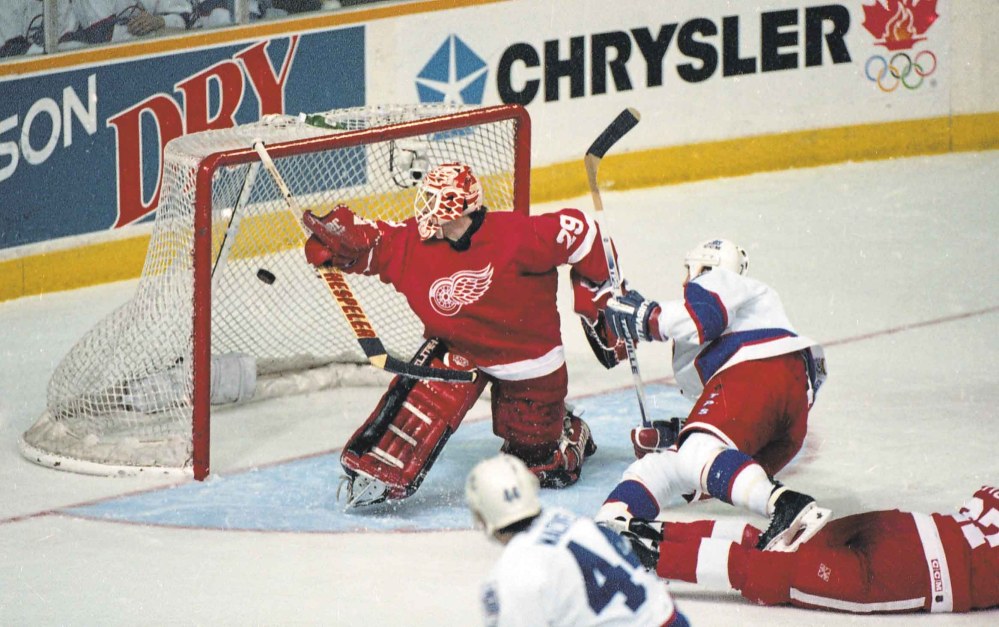
Even 45 minutes before puck drop in Game 6, the Jets knew white-clad fans had ramped up the party.
“We got thumped pretty bad (6-1) in Game 4 (in Winnipeg) and we got this long ovation because everybody thought that was it. We weren’t coming back. No one was giving us a chance (in Game 5). But Khabby made, like, 50 saves in Detroit, so we got a chance to come back for Game 6,” Maciver said.
“The one thing that was really cool was before the game. Our dressing room was directly under those stands behind the bench, and I remember how loud it was even before warmup. The noise, the energy, of that Whiteout. It was unbelievable.”
Maciver is the Seattle Kraken’s director of player personnel, and he’s knee-deep in preparations for the new team before the expansion draft.
He played university hockey in Duluth, Minn., and still calls the city along Lake Superior home, with Lisa, his wife of nearly 30 years, and the couple’s five children.
When Maciver united with his new Jets teammates, there was talk the club was bound for Minneapolis. However, just a month later it became clear Phoenix would be the final destination. He says players were unified in their desire to give Winnipeggers a final taste of playoff hockey.
“We put a lot of pressure on ourselves. The games down the stretch, we were in a fight to make the playoffs. When we beat L.A. (5-3, the second-last game of the regular season), it was nuts in there because now they knew the goodbye was getting extended,” he recalled.
“Everyone wanted one more Whiteout, which is the coolest thing I ever experienced in the NHL.”
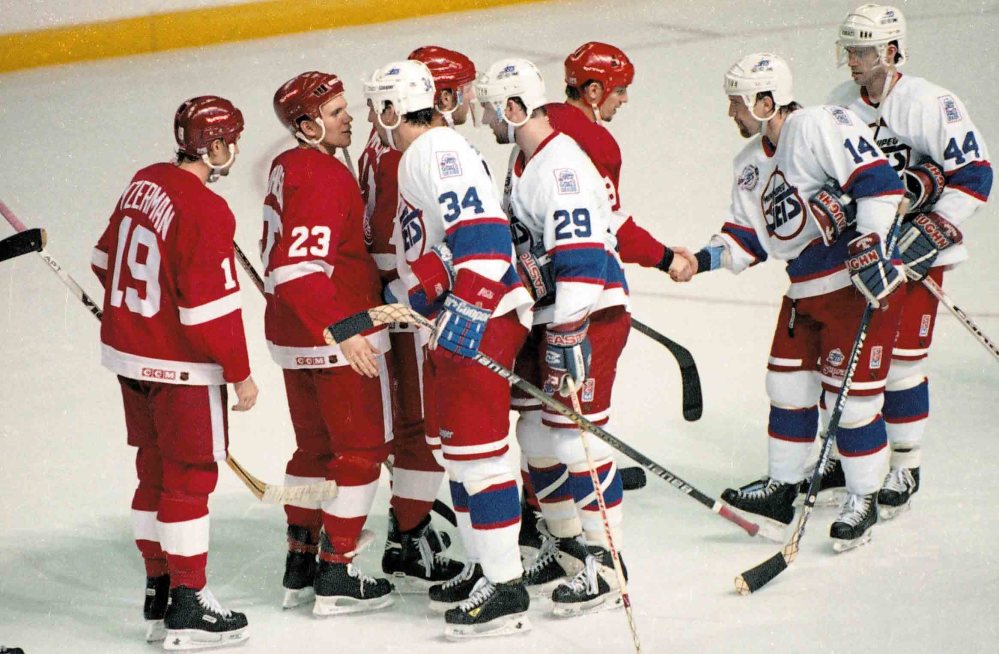
Maciver was with the Blackhawks organization for 13 seasons — winning three Stanley Cups — and was the assistant GM under Stan Bowman for eight seasons before taking on an exciting new opportunity with Seattle three months ago.
He always enjoys return visits to Winnipeg.
“The games that I’ve been there, when I worked with the Blackhawks the last 10 years, the atmosphere in the building and the passion the fans have in Winnipeg and all of Manitoba for hockey, and, certainly, for the Jets, is great,” he says. “It’s awesome they’re back and they have a very good team.”
●●●
It’s not that Kirk Maltby was a bad guy. But any pro athlete loves nothing more than to spoil a good party. And so it was all business, nothing personal, when Maltby and his Red Wings teammates arrived back in Winnipeg with the sole idea of putting the final nail in the coffin.
As one of the meat-and-potatoes players on a skilled squad with all kinds of offensive sizzle, Maltby got his hands dirty by getting in the faces of some of Winnipeg’s high-flying forwards. And that made him the subject of plenty of jeers from the Jets’ faithful.
“As a team coming in there in the playoffs, our objective was, of course, to win, but also not to let the crowd kind of take over and give Winnipeg any more momentum than they might get on their own,” Maltby, 48, said in an interview from San Jose, where he was taking in a Sharks-Coyotes game Monday night as part of his current duties as a pro scout with Detroit.
“As a player, you thrive on it; you feel like you’re getting under their skin and taking them out of the game a little bit. We were obviously heavy favourites to win. I think the belief there, especially when they were able to come back and play a Game 6, it was our job to try and get in the face of them and tick the fans off. Play physical, try to throw their high-end guys, which they had a few, get them off their games. Winnipeg has a very knowledgeable fan base, and they could see that.”
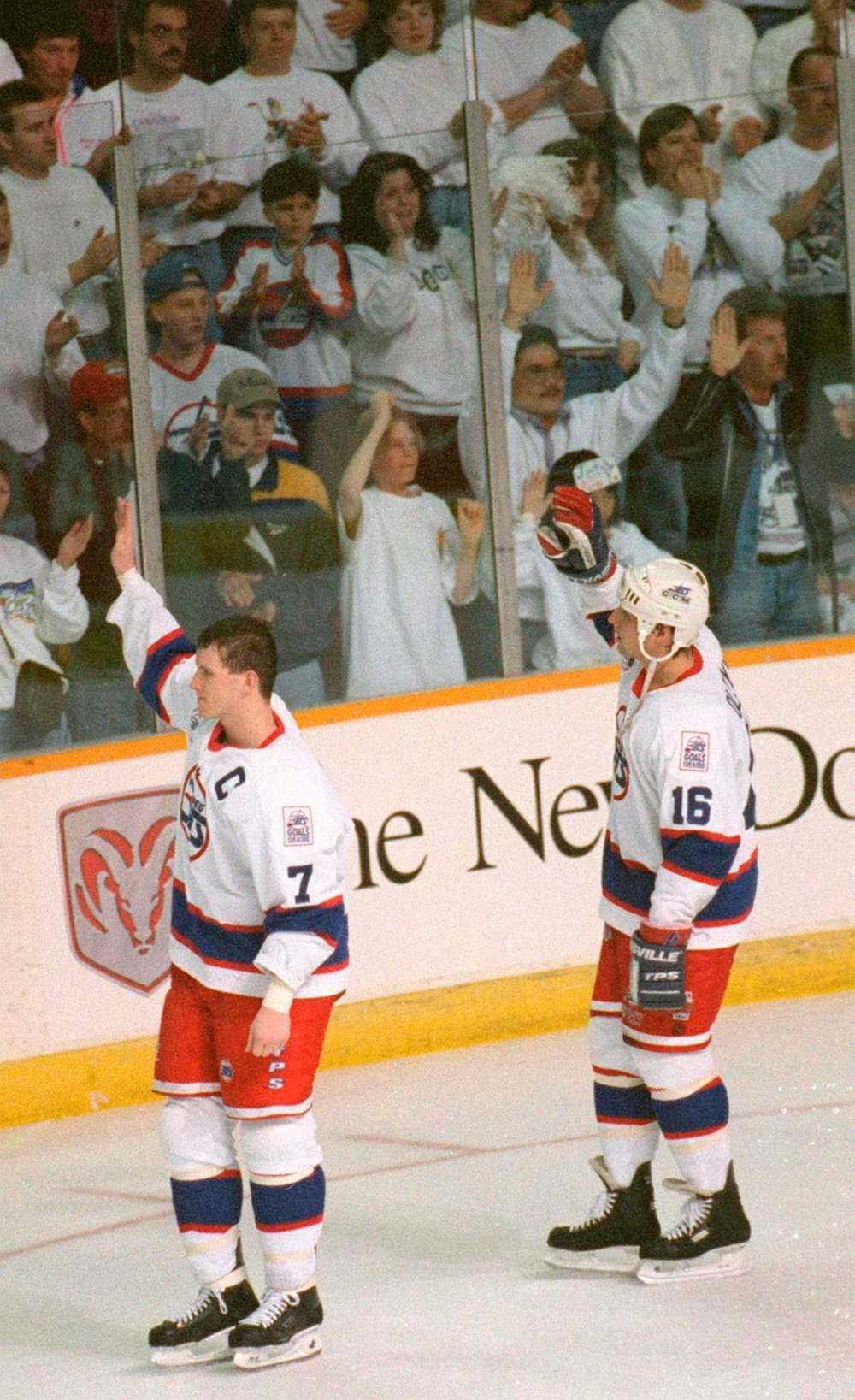
Of course, some early goals can take the crowd out of it, and Detroit struck for three in the opening frame. Vyacheslav Kozlov had the first two, at 3:46 and 14:54, and then Red Wings captain Steve Yzerman made it 3-0 at 16:31. Game, set, match.
“They got a second lease on life (in Game 5) and extended the series. I think the fans that night, win or lose, just wanted to really soak it in. And even though we won, the Jets put up a great fight,” said Maltby.
“That arena, with the big picture at the one end of Queen Elizabeth, how could you not remember that? It was loud, and that’s the one thing I remember to this day. I love, even to this day, watching the Whiteout. I think it’s something you can use — the adrenaline, the emotion — to help you in a game or a series.”
Although their run ended after beating Winnipeg with a third-round loss to Colorado, it only delayed the inevitable. Detroit won the Stanley Cup the following season, then again in 1998, 2002 and 2008.
“We had such an array of skill. Everyone had different roles. My time in Detroit was very special,” said Maltby, who was born in Guelph, Ont., and originally drafted by Edmonton, where he spent the first three years of his NHL career. He was traded to the Red Wings during that 1995-96 season, where he remained for 14 years until retiring in 2010.
“The character that was in there, the cast they were able to bring in over the years. The Russian Five brought a completely different brand of hockey to the NHL. When they were out there together, we got to see it all the time, but you still caught yourself in awe; the regroups and the regroups and next thing you know they’re in on a breakaway,” he said.
In some ways, that series against Winnipeg was a glimpse of what was to come.
●●●

It’s intriguing how things have come full circle for Jeff Finley.
The former NHLer, who patrolled the blue line for the Jets during their swan-song season, was hired by Winnipeg two summers ago as an amateur scout for Western Canada and parts of the western United States.
Finley, 54, had spent nearly a decade in Detroit’s scouting department but was let go when the Red Wings’ new boss cleaned house in 2019.
Yzerman and the Red Wings, it turns out, were the bad guys again.
“He took over and made some changes, got rid of a few of us and brought in his own people,” says Finley. “I was looking for work, and at the time Marcel Comeau retired for Winnipeg and they were looking for someone out west and it worked out. I played with Chevy back in the old Islander days… we had a relationship there, and (assistant GM and director of hockey operations Craig Heisinger) was in Winnipeg when I was there, so we had that connection. It’s worked out well.”
Finley’s NHL playing career spanned 15 years (1987-2004), a total of 708 games for five franchises, including 65 with the Jets during the 1995-96 campaign.
The year before, he was with Philadelphia’s organization, suiting up the entire 1994-95 campaign with the Flyers’ American Hockey League affiliate, the Hershey Bears. He was ecstatic after being dealt to the Jets in exchange for Winnipeg product Russ Romaniuk that summer, not caring about joining a team about to begin a lame-duck season.
“I didn’t care about that part of it at all. I was in the minors and was getting another NHL opportunity, so I was thrilled for that chance. A lot of it had to do with Terry Simpson. I had Terry with the Islanders and I had him in Philadelphia, so he knew me well and had a big hand in getting me to Winnipeg,” said Finley, now married with four kids and living in Kelowna, B.C.
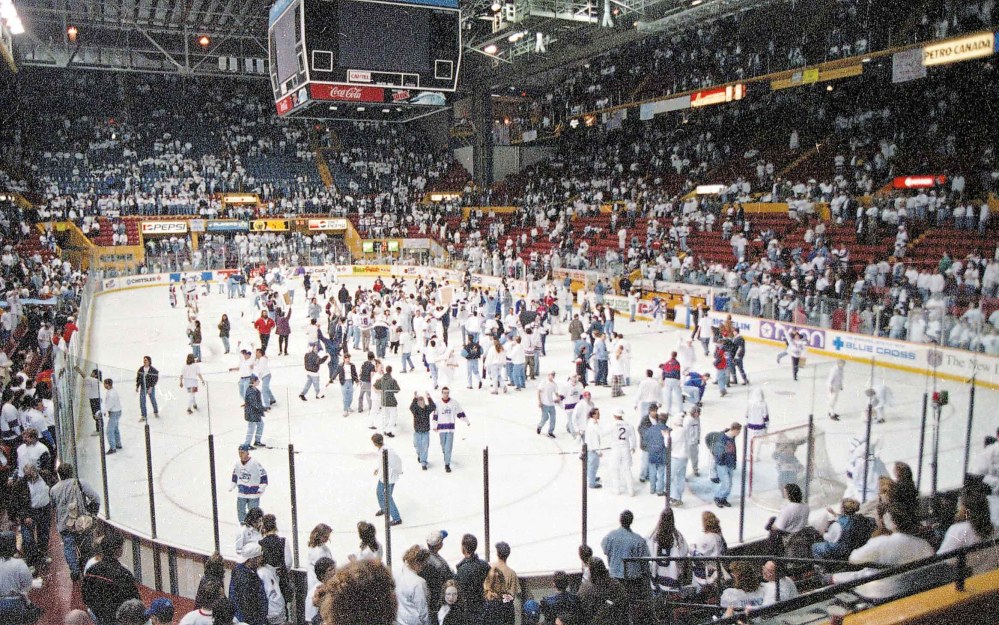
“The team was great, so many great players. Tkachuk and Selanne were stars. Khabibulin was outstanding. I played a lot with Teppo Numminen, who was outstanding. We had a good, competitive team and it was great to make the playoffs for the fans. No one forgets the Whiteout once you’ve been through it. That was special.”
While his memory of the post-season matchup with the Red Wings is sketchy, he recalls the Russian goaltender’s acrobatics were the only reason the series went to six games.
“Realistically, we were heavily overmatched. We kind of snuck into the playoffs. Khabibulin was unreal and made the series what it was. That Red Wings team was highly skilled and very deep,” he said.
“The home games were very special. The crowd noise was deafening. That last night was very sad. You could see the emotion on people at the end of the game when we stayed on the ice, waving and clapping for the fans. It was a hard night in a lot of ways.”
Growing up in Edmonton and appreciating the love affair for hockey on the Prairies, Finley understood the profound loss the community would soon come to feel.
“Absolutely, you could always feel the passion in Winnipeg. So, to know the team was leaving, it was a difficult time for everyone,” he said. “At that time, no way (the team was coming back), that’s for sure. I’m going by the (economics) at the end, too small a city and it’s not going to work here.”
Finley says he was thrilled when the NHL returned to the Manitoba capital a decade ago.
“Great market, great organization. It’s all starts with (Jets co-owner) Mark Chipman, he’s a great leader and makes everyone feel valued.”
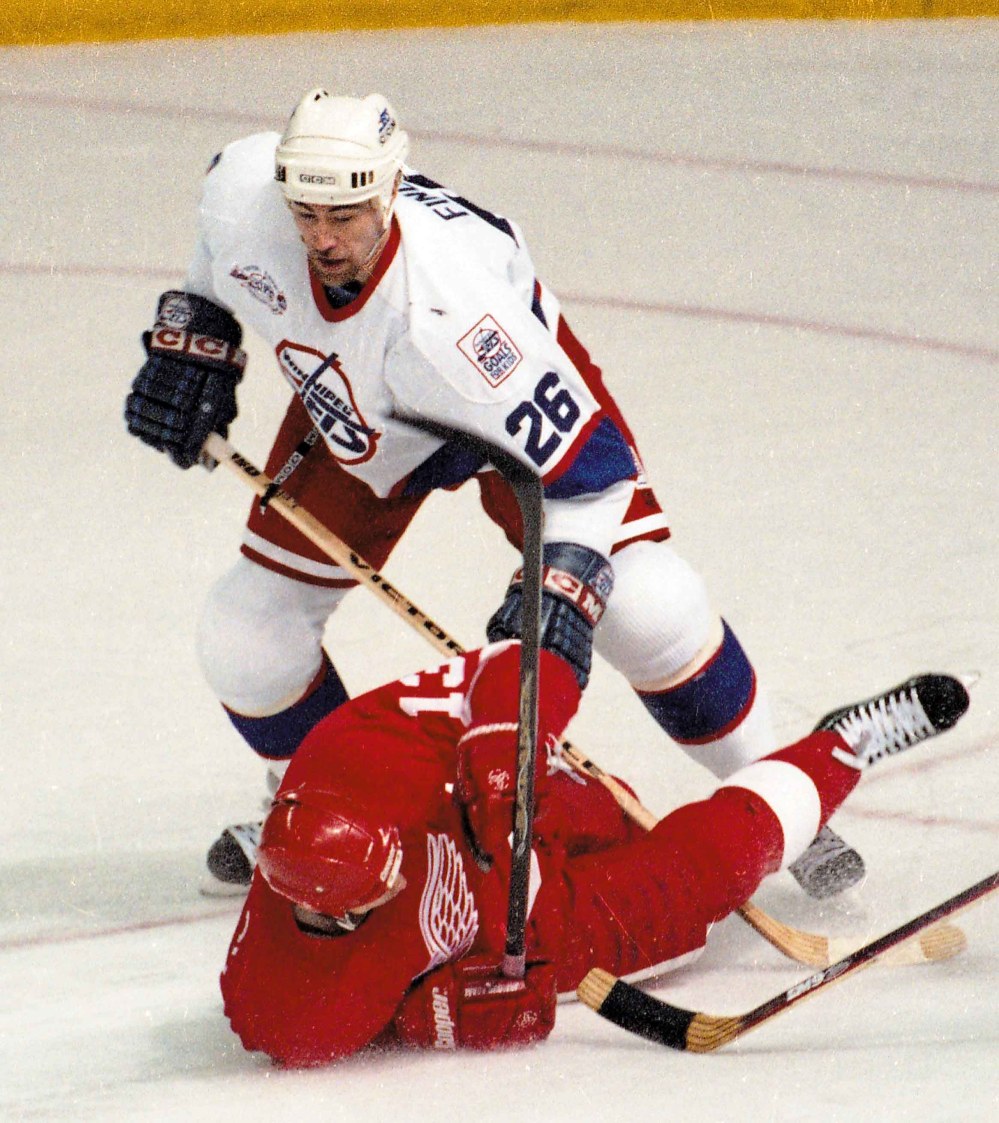
jason.bell@freepress.mb.ca
Twitter: @WFPJasonBell
mike.mcintyre@freepress.mb.ca
Twitter: @mikemcintyrewpg

Jason Bell wanted to be a lawyer when he was a kid. The movie The Paper Chase got him hooked on the idea of law school and, possibly, falling in love with someone exactly like Lindsay Wagner (before she went all bionic).

Mike McIntyre grew up wanting to be a professional wrestler. But when that dream fizzled, he put all his brawn into becoming a professional writer.
Our newsroom depends on a growing audience of readers to power our journalism. If you are not a paid reader, please consider becoming a subscriber.
Our newsroom depends on its audience of readers to power our journalism. Thank you for your support.
History
Updated on Tuesday, April 27, 2021 11:14 PM CDT: corrects spelling of Hershey.
Updated on Wednesday, April 28, 2021 8:57 AM CDT: Corrects spelling of Slava Fetisov's name.
Updated on Wednesday, April 28, 2021 7:09 PM CDT: Fixes typo.


